国际贸易实务(周瑞琪等)_课后答案详解
国际贸易实务第2章课后习题参考答案
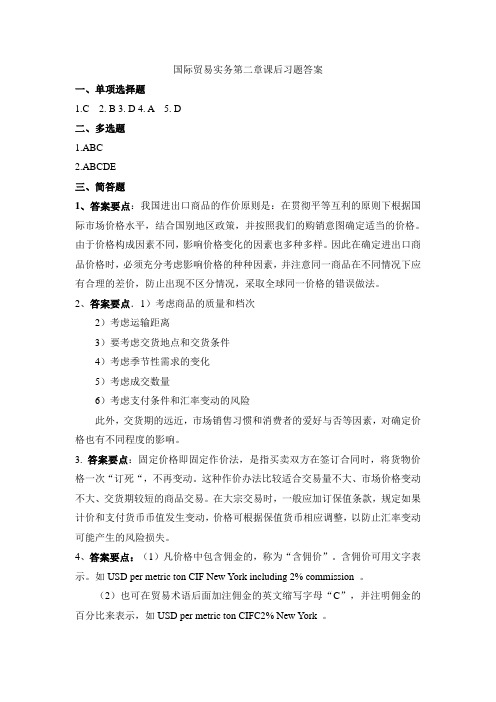
国际贸易实务第二章课后习题答案一、单项选择题1.C2. B3. D4. A5. D二、多选题1.ABC2.ABCDE三、简答题1、答案要点:我国进出口商品的作价原则是:在贯彻平等互利的原则下根据国际市场价格水平,结合国别地区政策,并按照我们的购销意图确定适当的价格。
由于价格构成因素不同,影响价格变化的因素也多种多样。
因此在确定进出口商品价格时,必须充分考虑影响价格的种种因素,并注意同一商品在不同情况下应有合理的差价,防止出现不区分情况,采取全球同一价格的错误做法。
2、答案要点.1)考虑商品的质量和档次2)考虑运输距离3)要考虑交货地点和交货条件4)考虑季节性需求的变化5)考虑成交数量6)考虑支付条件和汇率变动的风险此外,交货期的远近,市场销售习惯和消费者的爱好与否等因素,对确定价格也有不同程度的影响。
3.答案要点:固定价格即固定作价法,是指买卖双方在签订合同时,将货物价格一次“订死“,不再变动。
这种作价办法比较适合交易量不大、市场价格变动不大、交货期较短的商品交易。
在大宗交易时,一般应加订保值条款,规定如果计价和支付货币币值发生变动,价格可根据保值货币相应调整,以防止汇率变动可能产生的风险损失。
4、答案要点:(1)凡价格中包含佣金的,称为“含佣价”。
含佣价可用文字表示。
如USD per metric ton CIF New York including 2% commission 。
(2)也可在贸易术语后面加注佣金的英文缩写字母“C”,并注明佣金的百分比来表示,如USD per metric ton CIFC2% New York 。
(3)明佣的表示方法一般是在价格之后加列一定百分比的佣金率,如USD27.50 per piece CIFC5 New York ,这里的C5指5%commission ,即佣金率。
(4)除用百分比表示外,也可以用绝对数来表示,如“每公吨付佣金25美元”。
如中间商为了从买卖双方获取“双头佣金”或为了逃税,有时要求在合同中不规定佣金,而另按双方暗中达成的协议支付。
国际贸易实务课后含答案
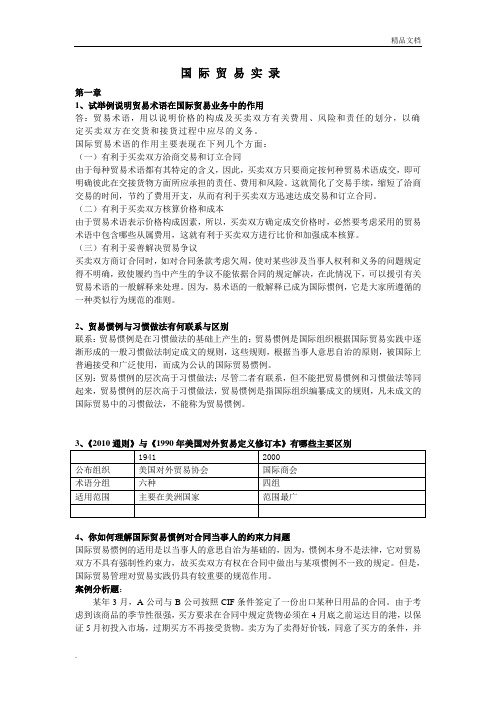
国际贸易实录第一章1、试举例说明贸易术语在国际贸易业务中的作用答:贸易术语,用以说明价格的构成及买卖双方有关费用、风险和责任的划分,以确定买卖双方在交货和接货过程中应尽的义务。
国际贸易术语的作用主要表现在下列几个方面:(一)有利于买卖双方洽商交易和订立合同由于每种贸易术语都有其特定的含义,因此,买卖双方只要商定按何种贸易术语成交,即可明确彼此在交接货物方面所应承担的责任、费用和风险。
这就简化了交易手续,缩短了洽商交易的时间,节约了费用开支,从而有利于买卖双方迅速达成交易和订立合同。
(二)有利于买卖双方核算价格和成本由于贸易术语表示价格构成因素,所以,买卖双方确定成交价格时,必然要考虑采用的贸易术语中包含哪些从属费用,这就有利于买卖双方进行比价和加强成本核算。
(三)有利于妥善解决贸易争议买卖双方商订合同时,如对合同条款考虑欠周,使对某些涉及当事人权利和义务的问题规定得不明确,致使履约当中产生的争议不能依据合同的规定解决,在此情况下,可以援引有关贸易术语的一般解释来处理。
因为,易术语的一般解释已成为国际惯例,它是大家所遵循的一种类似行为规范的准则。
2、贸易惯例与习惯做法有何联系与区别联系:贸易惯例是在习惯做法的基础上产生的;贸易惯例是国际组织根据国际贸易实践中逐渐形成的一般习惯做法制定成文的规则,这些规则,根据当事人意思自治的原则,被国际上普遍接受和广泛使用,而成为公认的国际贸易惯例。
区别:贸易惯例的层次高于习惯做法;尽管二者有联系,但不能把贸易惯例和习惯做法等同起来,贸易惯例的层次高于习惯做法,贸易惯例是指国际组织编纂成文的规则,凡未成文的国际贸易中的习惯做法,不能称为贸易惯例。
4、你如何理解国际贸易惯例对合同当事人的约束力问题国际贸易惯例的适用是以当事人的意思自治为基础的,因为,惯例本身不是法律,它对贸易双方不具有强制性约束力,故买卖双方有权在合同中做出与某项惯例不一致的规定。
但是,国际贸易管理对贸易实践仍具有较重要的规范作用。
国际贸易实务课后答案详解
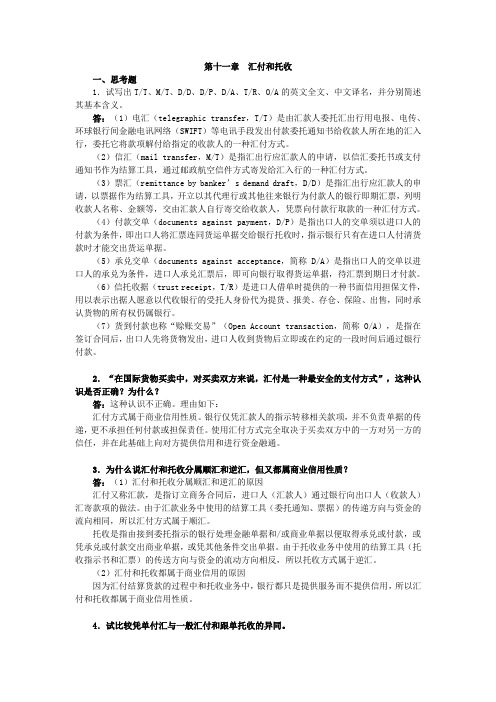
答:(1)托收的含义
按照《托收统一规则》(国际商会第522号出版物)的规定,托收是指由接到委托指示的银行处理金融单据和/或商业单据以便取得承兑或付款,或凭承兑或付款交出商业单据,或凭其他条件交出单据。
(2)托收的种类及其特点
按国际商会“522出版物”,托收可分为光票托收和跟单托收两种。
(2)汇付和托收都属于商业信用的原因
因为汇付结算货款的过程中和托收业务中,银行都只是提供服务而不提供信用,所以汇付和托收都属于商业信用性质。
4.试比较凭单付汇与一般汇付和跟单托收的异同。
答:(1)凭单付汇与一般汇付的异同
①两者相同点:两者都属于汇付方式,同属商业信用,具有汇付的共性特征。
②两者不同点:凭单付汇较之一般汇付方式易为买卖双方所接受,但其通常只适用于现货交易。
①光票托收。光票托收是指金融单据不附带商业单据的托收,即仅把金融单据委托银行代为收款。光票托收不附带商业单据,适用货款尾数、小额货款、贸易从属费用和索赔款的收取。
②跟单托收。跟单托收是指金融单据附带商业单据或不用金融单据的商业单据的托收。跟单托收附带商业单据,是货款结算通常使用的托收方式。
7.在出口业务中采用跟单托收方式通常应注意哪些问题?
答:一般说来,在出口贸易中采用托收方式时,为确保收汇安全,我外贸企业应妥善掌握以下几个方面的问题:
(1)认真调查和考察进口人的资信情况、经营能力和经营作风,掌握有关商品的市场信息,并在此基础上妥善制定授信额度、控制成交金额与交货进度。
(2)国外代收行一般不能由进口人指定,如确有必要,应事先征得托收行同意,以防进口人指定的代收行不可靠,或往来渠道不畅,造成托收行拒绝托收申请的被动局面,甚至因代收行信用不佳或产生意外而遭致货款落空。
《国际贸易实务》书后练习参考答案.doc
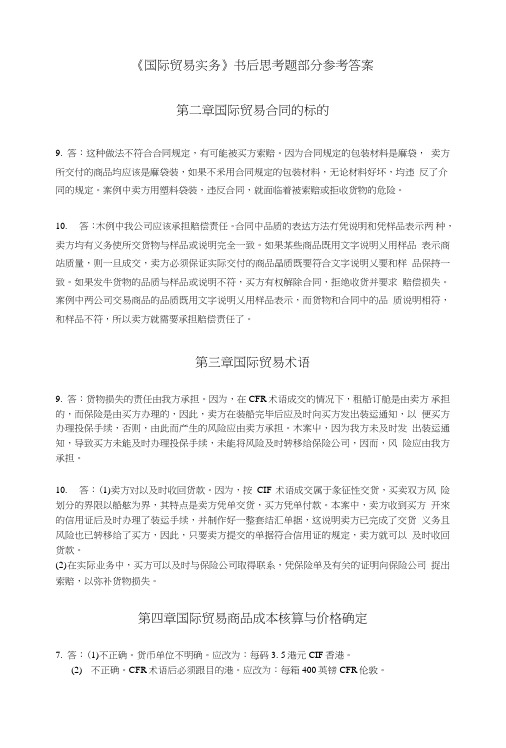
《国际贸易实务》书后思考题部分参考答案第二章国际贸易合同的标的9.答:这种做法不符合合同规定,有可能被买方索赔。
因为合同规定的包装材料是麻袋,卖方所交付的商品均应该是麻袋装,如果不釆用合同规定的包装材料,无论材料好坏,均违反了介同的规定。
案例中卖方用塑料袋装,违反合同,就面临着被索赔或拒收货物的危险。
10.答:木例中我公司应该承担赔偿责任。
合同中品质的表达方法冇凭说明和凭样品表示两种,卖方均有义务使所交货物与样品或说明完全一致。
如果某些商品既用文字说明乂用样品表示商站质量,则一旦成交,卖方必须保证实际交付的商品晶质既要符合文字说明乂要和样品保持一致。
如果发牛货物的品质与样品或说明不符,买方有权解除合同,拒绝收货并要求赔偿损失。
案例中两公司交易商品的品质既用文字说明乂用样品表示,而货物和合同中的品质说明相符,和样品不符,所以卖方就需要承担赔偿责任了。
第三章国际贸易术语9.答:货物损失的责任由我方承担。
因为,在CFR术语成交的情况下,租船订舱是由卖方承担的,而保险是由买方办理的,因此,卖方在装船完毕后应及时向买方发出装运通知,以便买方办理投保手续,否则,由此而产生的风险应由卖方承担。
木案屮,因为我方未及时发出装运通知,导致买方未能及时办理投保手续,未能将风险及时转移给保险公司,因而,风险应由我方承担。
10.答:(1)卖方对以及时收回货款。
因为,按CIF术语成交属于彖征性交货,买卖双方风险划分的界限以船舷为界,其特点是卖方凭单交货,买方凭单付款。
本案中,卖方收到买方开來的信用证后及时办理了装运手续,并制作好一整套结汇单据,这说明卖方已完成了交货义务且风险也已转移给了买方,因此,只要卖方提交的单据符合信用证的规定,卖方就可以及时收回货款。
(2)在实际业务中,买方可以及时与保险公司取得联系,凭保险单及有关的证明向保险公司捉出索赔,以弥补货物损失。
第四章国际贸易商品成本核算与价格确定7.答:(1)不正确。
货币单位不明确。
国际贸易实务 周瑞琪 课后题 名词解释 简答题
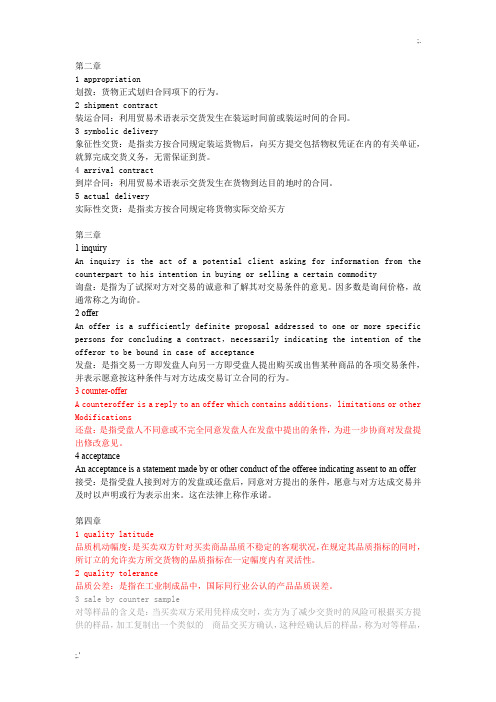
第二章1 appropriation划拨:货物正式划归合同项下的行为。
2 shipment contract装运合同:利用贸易术语表示交货发生在装运时间前或装运时间的合同。
3 symbolic delivery象征性交货:是指卖方按合同规定装运货物后,向买方提交包括物权凭证在内的有关单证,就算完成交货义务,无需保证到货。
4 arrival contract到岸合同:利用贸易术语表示交货发生在货物到达目的地时的合同。
5 actual delivery实际性交货:是指卖方按合同规定将货物实际交给买方第三章1 inquiryAn inquiry is the act of a potential client asking for information from the counterpart to his intention in buying or selling a certain commodity询盘:是指为了试探对方对交易的诚意和了解其对交易条件的意见。
因多数是询问价格,故通常称之为询价。
2 offerAn offer is a sufficiently definite proposal addressed to one or more specific persons for concluding a contract,necessarily indicating the intention of the offeror to be bound in case of acceptance发盘:是指交易一方即发盘人向另一方即受盘人提出购买或出售某种商品的各项交易条件,并表示愿意按这种条件与对方达成交易订立合同的行为。
3 counter-offerA counteroffer is a reply to an offer which contains additions,limitations or other Modifications还盘:是指受盘人不同意或不完全同意发盘人在发盘中提出的条件,为进一步协商对发盘提出修改意见。
国际贸易实务(周瑞琪等)-课后答案详解
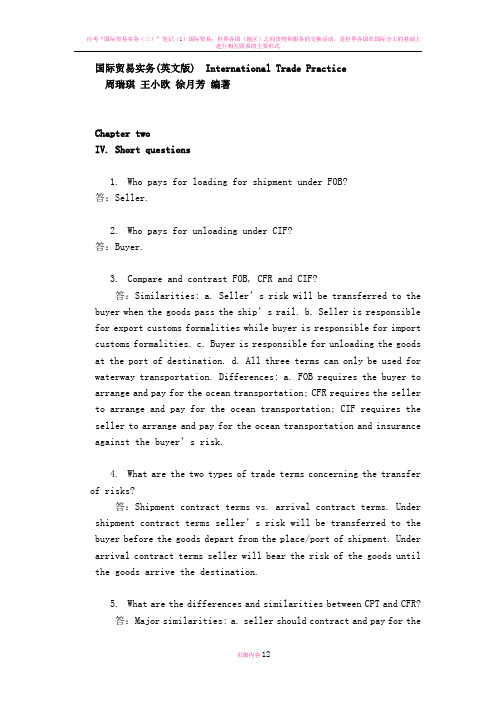
国际贸易实务(英文版) International Trade Practice周瑞琪王小欧徐月芳编著Chapter twoIV. Short questions1.Who pays for loading for shipment under FOB?答:Seller.2.Who pays for unloading under CIF?答:Buyer.pare and contrast FOB, CFR and CIF?答:Similarities: a. Sel ler’s risk will be transferred to the buyer when the goods pass the ship’s rail. b. Seller is responsible for export customs formalities while buyer is responsible for import customs formalities. c. Buyer is responsible for unloading the goods at the port of destination. d. All three terms can only be used for waterway transportation. Differences: a. FOB requires the buyer to arrange and pay for the ocean transportation; CFR requires the seller to arrange and pay for the ocean transportation; CIF requires the seller to arrange and pay for the ocean transportation and insurance against the buyer’s risk.4.What are the two types of trade terms concerning the transfer of risks?答:Shipment contract terms vs. arrival contract terms. Under shipment contract terms s eller’s risk will be transferred to the buyer before the goods depart from the place/port of shipment. Under arrival contract terms seller will bear the risk of the goods until the goods arrive the destination.5.What are the differences and similarities between CPT and CFR?答:Major similarities: a. seller should contract and pay for themajor carriage. b. Seller is not taking the risk of loss or damage to the goods during the transportation. Difference: a. CPT is applicable to any kind of transportation mode while CFR is only used for waterway transport. b. Under CPT seller’s risk will be transferred to the buyer when the goods are handed over to the first carrier nominated by seller. Under CFR seller’s risk will be transferred when the goods pass over the s hip’s rail.6.What are the differences and similarities between CIP and CIF?答:Major similarities: a. seller should contract and pay for the major carriage. b. Seller is not taking the risk of loss or damage to the goods during the transportation. c. Seller must obtain insurance against buyer’s risk. Difference: a. CPT is applicable to any kind of transportation mode while CFR is only used for waterway transport. b. Under CPT seller’s risk will be transferred to the buyer when the goods are handed over to the first carrier nominated by seller. Under CFR seller’s risk will be transferred when the goods pass over the ship’s rail.7.If you trade with an American, is the sales contract subject to Incoterms without any doubt? What should you do?答:No. The Revised American Foreign Trade Definitions 1941 is still in use, especially among the North American area. It has different interpretation about some trade terms. The traders should clarify the choice of rules before any further discussion.8.What are the most commonly used trade terms?答:FOB,CFR & CIF.9.Who is responsible for carrying out customs formalities for exports under an FOB contract?答:Seller. According to Incoterms 2000, except EXW and DDP these two terms, all the other eleven terms require the seller to handle the export customs formalities, while buyer the import customs formalities.10.If a Chinese trader signs a FOB Hamburg contract, is he exporting or importing?答:Importing. FOB should be used with a “named port of shipment”, if Hamburg is the port of shipment, from the Chinese trader’s perspective, he is importing.V.Case Studies1. An FOB contract stipulated, "The shipment will be effected in March 2008. If the vessel fails to arrive at the port of shipment on time, the seller agrees to set aside the goods for additional 27 days, and the buyer will bear all costs of delay." it turned out that under the seller's repeated requests, the vessel named by the buyer finally arrived at the port of shipment on May 1. As a result, the seller refused to make the shipment.(1)Was the seller entitled to compensation for thewarehouse rent, insurance and interest due to the delay?(2)If the seller had sold the goods to a third party onApril 25, should the buyer pay for the delay?(3)If the seller had sold the goods to a third party onMay 1 with a better price, was he entitled to any compensation?析: a案例中提到“shipment will be effected in March 2008”,这种确定装运时间的方式允许在整个3月份期间的任何时间进行装运。
国际贸易实务课后答案

P90 答:在签订合同时,没有具体规定外商提供的设备规格、型号、性能、生产国别和制造日期,当产品与口头协定的不符时,该国内用户无法向供应商要求索赔,起不到很好的法律保护作用;也没有规定品质保证期、检验机构、检验标准和索赔期,该国内用户显然签订了对自己极为不利的合同条款,购买了没有品质保障的产品。
当产品出现质量问题及需要维修时,因为没有相关的规定,该国内用户不能很好地用法律保护自己的利益。
我们从中学到,签订买卖合同时,应严格考虑到多方面的问题,明确产品品名条款及质量条款等多方面的问题,充分了解对方的具体信息。
在签订品名条款时应注意合理性、正确性及明确性。
在签订品质条款时,应对成交商品的质量要求做出全面、确切的规定。
订立严格的买卖合同,有利于更好地保护自己的利益。
P128答:国际货物的买卖中,合同的签订需慎重考虑。
每一个贸易术语均有多种变形条款及规定,所以不能仅依靠一个贸易术语一笔带过该合同中的装运、滞期费、速遣费等问题,应明确规定各方的权责义务,以防引发争议和纠纷。
同时,对于确定国外装运港时,应结合考虑装运港的特殊因素,如有无直达班轮航线,港口和装卸条件以及运费和附加费水平,有无冰封期等,再做出相应的规定。
总之,买卖双方在明确装运港时,通常都是从本身利益和实际需要出发,根据产、销和运输等因素考虑的。
为了使装运港和目的港条款顶得合理,我们必须从多方面加以考虑,特别是国外港口很多,情况复杂,在确定国外装运港和目的港时,应格外谨慎。
P160 答:保险公司拒绝是合理的,依照国际贸易术语解释通则2010,CIF买卖双方在海上运输中的风险,是以货在装货港装上船为界限来划分的。
即货物装船前的风险由卖方承担,装船后的风险由买方承担,所以货物在装船前对卖方具有的保险利益,装船之后转移到对买方具有保险利益。
如上所述,不具备保险利益则得不到保险赔偿,该案中,货物损失发生在装船以前,所以保险利益归卖方,买方无保险利益,所以保险公司拒赔是有道理的。
(完整版)国际贸易实务(周瑞琪等)_课后答案详解
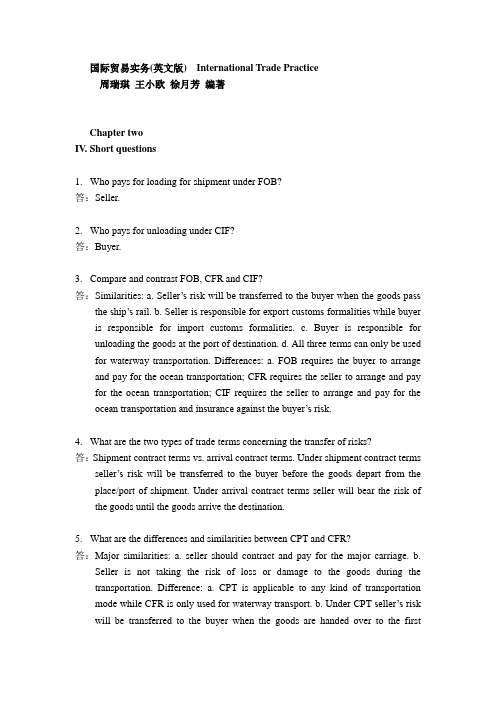
国际贸易实务(英文版) International Trade Practice周瑞琪王小欧徐月芳编著Chapter twoIV. Short questions1.Who pays for loading for shipment under FOB?答:Seller.2.Who pays for unloading under CIF?答:Buyer.pare and contrast FOB, CFR and CIF?答:Similarities: a. Sel ler’s risk will be transferred to the buyer when the goods pass the ship’s rail. b. Seller is responsible for export customs formalities while buyer is responsible for import customs formalities. c. Buyer is responsible for unloading the goods at the port of destination. d. All three terms can only be used for waterway transportation. Differences: a. FOB requires the buyer to arrange and pay for the ocean transportation; CFR requires the seller to arrange and pay for the ocean transportation; CIF requires the seller to arrange and pay for the ocean transportation and insurance against the buyer’s risk.4.What are the two types of trade terms concerning the transfer of risks?答:Shipment contract terms vs. arrival contract terms. Under shipment contract terms s eller’s risk will be transferred to the buyer before the goods depart from the place/port of shipment. Under arrival contract terms seller will bear the risk of the goods until the goods arrive the destination.5.What are the differences and similarities between CPT and CFR?答:Major similarities: a. seller should contract and pay for the major carriage. b.Seller is not taking the risk of loss or damage to the goods during the transportation. Difference: a. CPT is applicable to any kind of transportation mode while CFR is only used for waterway transport. b. Under CPT seller’s risk will be transferred to the buyer when the goods are handed over to the firstcarrier nominated by seller. Under CFR seller’s risk will be transferred when the goods pass over the ship’s rail.6.What are the differences and similarities between CIP and CIF?答:Major similarities: a. seller should contract and pay for the major carriage. b.Seller is not taking the risk of loss or damage to the goods during the transportation. c. Seller must obtain insurance against buyer’s risk. Difference: a.CPT is applicable to any kind of transportation mode while CFR is only used for waterway transport. b. Under CPT seller’s risk will be transferred to the buyer when the goods are handed over to the first carrier nominated by seller. Under CFR seller’s risk will be transferred when the goods pass over the ship’s rail.7.If you trade with an American, is the sales contract subject to Incoterms withoutany doubt? What should you do?答:No. The Revised American Foreign Trade Definitions 1941 is still in use, especially among the North American area. It has different interpretation about some trade terms. The traders should clarify the choice of rules before any further discussion.8.What are the most commonly used trade terms?答:FOB,CFR & CIF.9.Who is responsible for carrying out customs formalities for exports under an FOBcontract?答:Seller. According to Incoterms 2000, except EXW and DDP these two terms, all the other eleven terms require the seller to handle the export customs formalities, while buyer the import customs formalities.10.If a Chinese trader signs a FOB Hamburg contract, is he exporting or importing? 答:Importing. FOB should be used with a “named port of shipment”, if Hamb urg is the port of shipment, from the Chinese trader’s perspective, he is importing.V.Case Studies1. An FOB contract stipulated, "The shipment will be effected in March 2008. If thevessel fails to arrive at the port of shipment on time, the seller agrees to set aside the goods for additional 27 days, and the buyer will bear all costs of delay." it turned out that under the seller's repeated requests, the vessel named by the buyer finally arrived at the port of shipment on May 1. As a result, the seller refused to make the shipment.(1)Was the seller entitled to compensation for the warehouse rent, insurance andinterest due to the delay?(2)If the seller had sold the goods to a third party on April 25, should the buyerpay for the delay?(3)If the seller had sold the goods to a third party on May 1 with a better price,was he entitled to any compensation?析:a案例中提到“shipment will be effected in March 2008”,这种确定装运时间的方式允许在整个3月份期间的任何时间进行装运。
- 1、下载文档前请自行甄别文档内容的完整性,平台不提供额外的编辑、内容补充、找答案等附加服务。
- 2、"仅部分预览"的文档,不可在线预览部分如存在完整性等问题,可反馈申请退款(可完整预览的文档不适用该条件!)。
- 3、如文档侵犯您的权益,请联系客服反馈,我们会尽快为您处理(人工客服工作时间:9:00-18:30)。
国际贸易实务(英文版) International Trade Practice周瑞琪王小欧徐月芳编著Chapter twoIV. Short questions1.Who pays for loading for shipment under FOB?答:Seller.2.Who pays for unloading under CIF?答:Buyer.pare and contrast FOB, CFR and CIF?答:Similarities: a. Sel ler’s risk will be transferred to the buyer when the goods pass the ship’s rail. b. Seller is responsible for export customs formalities while buyer is responsible for import customs formalities. c. Buyer is responsible for unloading the goods at the port of destination. d. All three terms can only be used for waterway transportation. Differences: a. FOB requires the buyer to arrange and pay for the ocean transportation; CFR requires the seller to arrange and pay for the ocean transportation; CIF requires the seller to arrange and pay for the ocean transportation and insurance against the buyer’s risk.4.What are the two types of trade terms concerning the transfer of risks?答:Shipment contract terms vs. arrival contract terms. Under shipment contract terms s eller’s risk will be transferred to the buyer before the goods depart from the place/port of shipment. Under arrival contract terms seller will bear the risk of the goods until the goods arrive the destination.5.What are the differences and similarities between CPT and CFR?答:Major similarities: a. seller should contract and pay for the major carriage. b.Seller is not taking the risk of loss or damage to the goods during the transportation. Difference: a. CPT is applicable to any kind of transportation mode while CFR is only used for waterway transport. b. Under CPT seller’s risk will be transferred to the buyer when the goods are handed over to the firstcarrier nominated by seller. Under CFR seller’s risk will be transferred when the goods pass over the ship’s rail.6.What are the differences and similarities between CIP and CIF?答:Major similarities: a. seller should contract and pay for the major carriage. b.Seller is not taking the risk of loss or damage to the goods during the transportation. c. Seller must obtain insurance against buyer’s risk. Difference: a.CPT is applicable to any kind of transportation mode while CFR is only used for waterway transport. b. Under CPT seller’s risk will be transferred to the buyer when the goods are handed over to the first carrier nominated by seller. Under CFR seller’s risk will be transferred when the goods pass over the ship’s rail.7.If you trade with an American, is the sales contract subject to Incoterms withoutany doubt? What should you do?答:No. The Revised American Foreign Trade Definitions 1941 is still in use, especially among the North American area. It has different interpretation about some trade terms. The traders should clarify the choice of rules before any further discussion.8.What are the most commonly used trade terms?答:FOB,CFR & CIF.9.Who is responsible for carrying out customs formalities for exports under an FOBcontract?答:Seller. According to Incoterms 2000, except EXW and DDP these two terms, all the other eleven terms require the seller to handle the export customs formalities, while buyer the import customs formalities.10.If a Chinese trader signs a FOB Hamburg contract, is he exporting or importing? 答:Importing. FOB should be used with a “named port of shipment”, if Hamb urg is the port of shipment, from the Chinese trader’s perspective, he is importing.V.Case Studies1. An FOB contract stipulated, "The shipment will be effected in March 2008. If thevessel fails to arrive at the port of shipment on time, the seller agrees to set aside the goods for additional 27 days, and the buyer will bear all costs of delay." it turned out that under the seller's repeated requests, the vessel named by the buyer finally arrived at the port of shipment on May 1. As a result, the seller refused to make the shipment.(1)Was the seller entitled to compensation for the warehouse rent, insurance andinterest due to the delay?(2)If the seller had sold the goods to a third party on April 25, should the buyerpay for the delay?(3)If the seller had sold the goods to a third party on May 1 with a better price,was he entitled to any compensation?析:a案例中提到“shipment will be effected in March 2008”,这种确定装运时间的方式允许在整个3月份期间的任何时间进行装运。
也即是说,装运的最后期限为08年3月31日。
b文中提到的“additional 27 days”,根据合同卖方同意在买方船期延误的情况下为其将货物保留到4月27日。
(1)答案:Yes。
答题切入点:a FOB术语关于双方费用划分的规定;b 合同本身的条款规定。
(2)答案:No。
答题切入点:合同本身的条款规定。
(3)这题与第一题相比,不同的一点在于“with a better price”。
